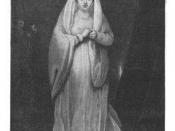Throughout Bram Stokers novel Dracula and William Shakespeare's tragedy Macbeth, the female characters Mina, Lucy, and Lady Macbeth represent the negative and positive aspects of the presence of women in certain situations. Throughout the entire novel, Mina possesses a "good heart" and great respect for her husband. Dracula influences Lucy all the way to her death and into her after life as a vampire. Lady Macbeth is the true essence of evil because she only "adds more fuel to the flames".
Lady Macbeth makes it clear that her motives are all personal, but Macbeth always plays a vital element in all her actions. "All hail Macbeth! Hail to thee, Thane of Glamis! All hail Macbeth! Hail to thee, Thane of Cawdor! All hail Macbeth, that shalt be king hereafter! (17)", the witches originally put the idea that Macbeth will be king one day. After learning this information Macbeth writes a letter to his wife, Lady Macbeth instantly has thoughts of how great life would be as queen and the potential power.
The moment Lady Macbeth hears that King Duncan is coming to visit thoughts of assassinating Duncan filters her mind. Though she wants Duncan dead, she wants nothing to do with the murder and forces Macbeth to kill the man. Lady Macbeth may not want apart in the death, but ultimately her hands feel the blood of Duncan and forever she is traumatized.
Lady Macbeth has a downward spiral after Duncan death; she frequently sleepwalks and at one point confessed to the murder of Duncan. After Macbeth's crowning, directly afterward he starts to feel disgruntled thinking that he must eliminate the competition to the throne. "O, full of scorpions is my mind, dear wife! Thou know'st that Banquo and his Fleance lives. (93)", Macbeth admits to Lady Macbeth that he...


